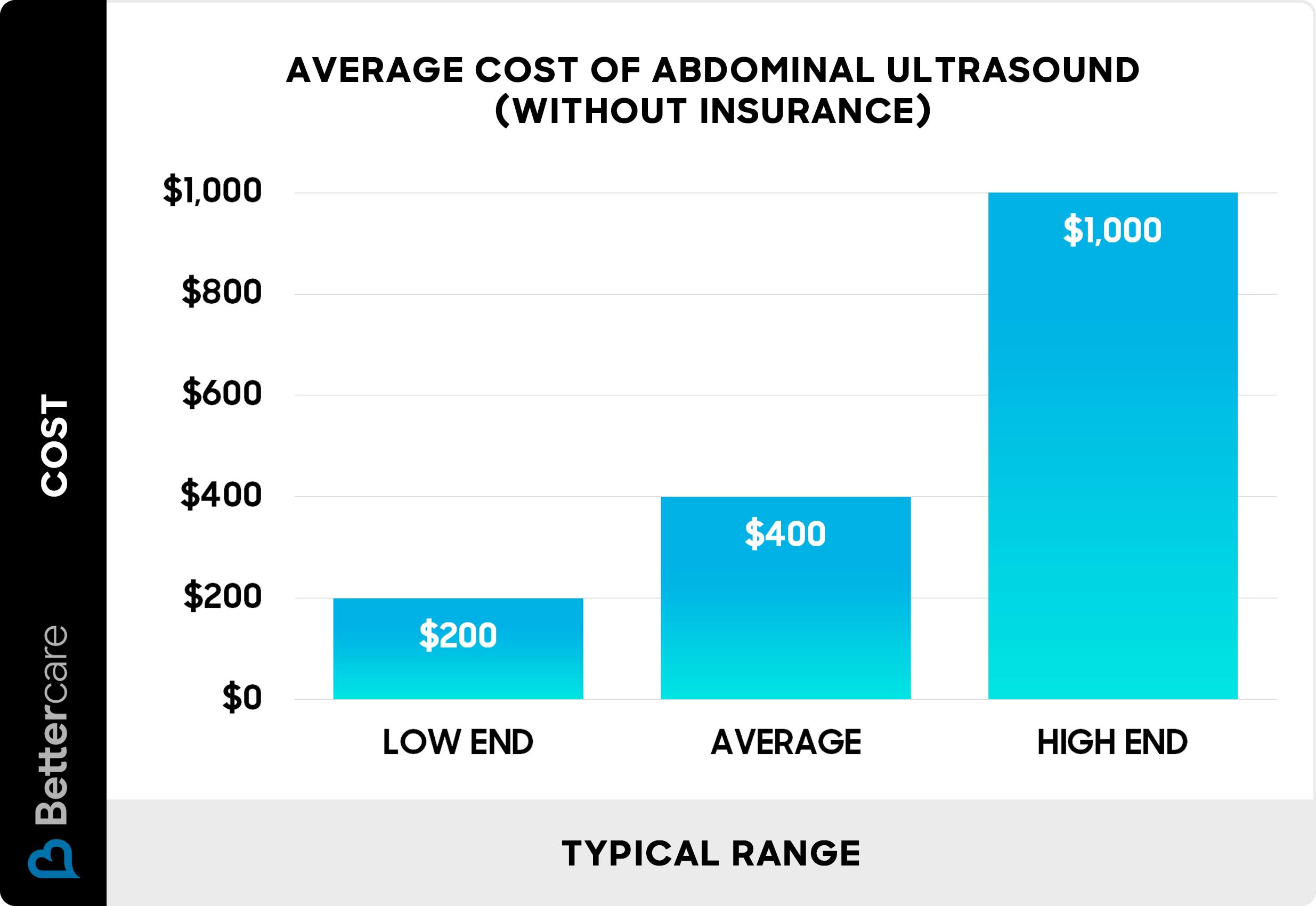
How much does an abdominal ultrasound cost without insurance?
How much does an abdominal ultrasound cost without insurance?
$200 – $1,000 average cost
Abdominal ultrasound cost
An abdominal ultrasound costs $200 to $1,000 without insurance, with most patients paying around $400 for the procedure. Stomach ultrasound costs depend on the facility, your geographic location, and any additional services. Most people have ultrasounds done at outpatient clinics or imaging centers, where costs are considerably lower than inpatient hospitals.
At some hospitals, the cost of an abdominal ultrasound can reach $2,000 or more. Many hospitals offer discounts or financial assistance for patients without insurance who are paying out of pocket.

| National Average Cost | $400 |
| Minimum Cost | $110 |
| Maximum Cost | $2,200 |
| Average Range | $200 to $1,000 |
Abdominal ultrasound price factors
Several factors impact the final cost of an ultrasound:
Type of facility: Outpatient clinics and imaging centers often charge less than hospitals for the same test.
Type of ultrasound technology: Most scans use standard 2D imaging. If a provider recommends a 3D or 4D ultrasound for more detailed or colored images, expect a higher price for the procedure.
Geographic location: Ultrasounds cost more in areas with higher overall healthcare costs, like major cities or certain states with higher costs of living.
Insurance coverage: Insurance can greatly reduce your out-of-pocket expenses, especially after meeting your deductible.
Scan complexity: More detailed or specialized ultrasounds (like Doppler or with added imaging) cost more.
Radiologist / physician fees: Charges for interpreting results may be billed separately and increase the total cost.
Payment method: Cash-pay discounts are often available to those without insurance or who pay up front.
Additional services: Pre-scan consultations, post-scan visits, or urgent appointments can raise your total expense.
What is an abdominal ultrasound?
An abdominal ultrasound is a noninvasive imaging test that uses high-frequency sound waves to produce real-time images of the organs and structures inside your abdomen. It is performed by moving a handheld device called a transducer across your stomach. The test helps doctors check for issues related to pain, swelling, or abnormal blood test results.
What does an abdominal ultrasound show?
An abdominal ultrasound helps doctors see:
Liver: Detects cysts, tumors, fatty liver, cirrhosis, or abscesses
Gallbladder: Looks for gallstones, inflammation, or blockages
Kidneys: Shows kidney stones, cysts, tumors, or infections
Pancreas: Can reveal pancreatic masses or inflammation
Spleen: Checks for enlargement, injury, or abnormal growths
Abdominal aorta: Detects aneurysms or other blood vessel problems
Bladder: Assesses size, urinary retention, or bladder stones
Why would a doctor order an abdominal ultrasound?
A doctor may order an abdominal ultrasound if you have unexplained abdominal pain, bloating, abnormal blood tests, or signs of a possible problem in your digestive or urinary organs. The scan is also used to monitor chronic conditions, check for complications, or guide procedures when more targeted imaging is needed.
What to expect from abdominal ultrasound
Before your ultrasound:
Most patients are told not to eat or drink for 8 to 12 hours ahead of the scan. Some may be asked to drink water to fill the bladder. Always follow your provider's preparation instructions for the best imaging results.
During your ultrasound:
You will lie on an exam table while a technician moves a handheld device with gel across your abdomen. The test is painless and takes 20 to 40 minutes, depending on which organs need to be imaged.
After your ultrasound:
You can resume normal activities immediately. A radiologist will review your images and send results to your doctor, who will discuss the findings and any next steps with you.

FAQs about abdominal ultrasound
How long does an abdominal ultrasound take?
Most abdominal ultrasounds take 20 to 40 minutes. The exact time depends on what organs are being examined.
Can an abdominal ultrasound detect bowel problems?
An abdominal ultrasound can spot some bowel issues, such as inflammation or large masses. However, it is limited for diagnosing most detailed bowel conditions.
Can an abdominal ultrasound detect endometriosis?
An abdominal ultrasound usually cannot detect endometriosis. Endometriosis is better identified with pelvic ultrasound, MRI, or laparoscopy.
Can I drink water before an abdominal ultrasound?
You may be asked to drink water if your bladder needs to be full for the scan. Otherwise, you are often instructed to fast and avoid drinking or eating for several hours. Check with your healthcare provider about how to prepare for your test.
Can an abdominal ultrasound detect cancer?
An abdominal ultrasound can find tumors or suspicious masses in organs, but it cannot confirm cancer. Further imaging and biopsy are needed for a cancer diagnosis.
Does urgent care do abdominal ultrasound?
Some urgent care centers offer abdominal ultrasounds, but availability varies. Larger centers or those with in-house imaging services are more likely to provide it.
Questions to ask your healthcare provider
Be prepared for your abdominal ultrasound by asking your healthcare provider these important questions:
What specific reason are you ordering this abdominal ultrasound?
Do I need to fast or have a full bladder before the exam?
Should I continue taking my regular medications on the day of the test?
How much will this ultrasound cost out of pocket, and can I get an estimate?
Where will the ultrasound be performed (hospital, imaging center, or clinic)?
How long will the procedure take, and when will I get my results?
Who will explain my results and any next steps?
Are there any risks or follow-up exams I should expect?
What should I do if I need to reschedule or have additional questions later?